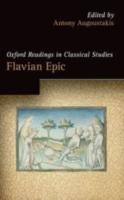
OUP (2016) h/b 538pp £90.00 (ISBN 9780199650668)
Valerius Flaccus, Statius, and Silius Italicus have never been so accessible: as A.’s Introduction makes abundantly clear, all three of them have benefited from a proliferation of commentaries, monographs, papers, and translations. And yet… If recent decades have witnessed a recuperation of these authors or even a veritable ‘Flavian renaissance’, as the avalanche of scholarship is often called, much remains to be done. There can be no doubt that this excellent collection of articles, curated by a world-leading scholar of Flavian poetry, will do much to aid this process.
In a review of this length, there is little point in summarizing the individual contributions to these ‘Oxford Readings in Classical Studies’, which have all appeared before elsewhere and become mainstays of literary criticism on these poets; instead I shall focus on some striking features of this collection. First of all, there is an uneven distribution of articles per author. Valerius, whose Argonautica is the shortest of the Flavian epics, (understandably) gets four, Statius’ Achilleid and Thebaid receive seven (of which only Hinds’ piece deals with the former poem), and Silius, whose Punica is the longest epic, somewhat surprisingly has five articles. Second, A.’s selection contains three Italian articles that appear in English for the first time (Nordera, Fucecchi, Mezzanotte). Such a broad outlook is to be welcomed, though it begs the question whether nothing worthwhile has been produced in German or French. That said, limitations of space are always bound to result in a somewhat partisan selection. With regard to both points, contrast the situation of the Neronian epic poet Lucan, who has an entire volume of ‘Oxford Readings’ to himself which include articles that appeared in English, French, German, and Italian.
Third, and perhaps most importantly, A.’s selection is exclusively concerned with intertextuality. This undoubtedly is an accurate reflection on the state of research: criticism has always been much concerned with these authors’ place in the literary tradition and their relative chronologies (and the question of who is alluding to whom). But at the same time it is a tell-tale sign that the Flavian revolution is not yet finished. By discussing the ways in which the epicists reflect on (confirm, criticize, problematize, reject) the writings of their Augustan predecessors, as all papers do, the Flavians are drawn into or assimilated to this most studied period of Latin literature. A similar strategy has served Ovid well in the past and facilitated his metamorphosis from a ‘Silver Age poet’ to a Latin classic (one feels that, like the Flavians, Lucan and Seneca poeta might not quite have attained this status yet).
Bibliographical references, where feasible, have been updated by the authors and/or editor in order to reflect the state of the field. This is a great service to the book’s readership that enhances its utility, both as a reference book for established scholars and as a way into Flavian epic for those new to it. The collection is superbly edited (I found just one typo, in the Preface: p. vii withrdraw > withdraw). In conclusion, A. (once again) deserves our gratitude for putting together an excellent and coherent set of papers that help the reader understand not only the Flavian poets’ attitudes towards their Augustan predecessors but also to each other.
Gary Vos
